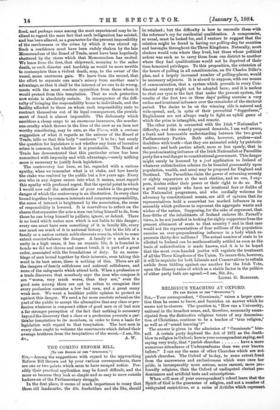THE COMING REFORM BILL.
[To TRH EDITOR OF TER " SPECTATOR:1 Sut,—Among the suggestions with regard to the approaching Reform Bill thrown out by your various correspondents, there are one or two points which seem to have escaped notice. Pos- sibly their practical application may be found difficult, and the more so because they look so simple and so easy to mere outside lookers-on of the Parliamentary struggle.
In the first place, it seems of much importance to many that those old landmarks, the 40s. freeholders and the like, should be retained ; but the difficulty is how to reconcile them with the reformer's cry for residential qualification. A compromise, as usual, must be looked for, and I venture to suggest that the solution might be found in having one polling-day for counties and boroughs throughout the Three Kingdoms. Naturally, most electors would vote where they lived, but those whose political ardour was such as to carry them from one district to another where they had qualifications would not be deprived of their• time-honoured privileges. To this proposition, the extension of the hours of polling in all constituencies, on Sir Charles Dilke's. plan, and a largely increased number of polling-places, would be necessary adjuncts. It is absurd to suppose, with our means of communication, that a system which prevails in every Con- tinental country might not be adopted here ; and it is useless to shut our eyes to the fact that under the present system, the results of the first two or three days' polling exercise a very undue and irrational influence over the remainder of the electoral period. The desire to be on the winning side is natural and wide-spread, and, in spite of their proverbial "doggedness,'' Englishmen are not always ready to fight an uphill game of which the prize is intangible, and remote.
The other point is connected with the Irish " Nationalist " difficulty, and the remedy proposed demands, I am well aware, a frank and honourable understanding between the two great Parliamentary Parties. Both sides, however, profess—and doubtless with truth—that they are animated solely by patriotic motives ; and both parties admit, more or less openly, that in the predominating influence of the Irish Nationalist or Parnellite party lies a real danger to constitutional government. This danger might surely be lessened by a just application to Ireland of whatever redistribution scheme (to be founded presumably upon populati6n, wealth, and area) may be proposed for England and Scotland. The Parnellites claim the power of returning seventy or eighty supporters at the next election, and no one, I sup- pose, doubts either their power or their right to do so. But a good many people who have no irrational fear or dislike of the Nationalist programme, and who cordially welcome its advocacy by constitutional means, are still of opinion that its representatives hold a somewhat too marked influence in an assembly which professes to represent the aggregate wants and wishes of the nation. Supposing, for the sake of argument, that. four-fifths of the inhabitants of Ireland endorse Mr. Parnell's views, is he not justified in looking for eighty supporters from the present allotment of seats to that country ? and in that case would not the representatives of four millions of the population exercise an over-preponderating influence in a body which re- presents thirty-five millions ? The actual number of seats to be allotted to Ireland can be mathematically settled as soon as the basis of redistribution is made known, and it is to be hoped that the most even-handed justice will regulate the treatment. of all the Three Kingdoms of the Union. To insure this, however, it will be requisite for both Liberals and Conservatives to refrain awhile from bidding against one another for the Irish Vote,. upon the illusory value of which as a stable factor in the politics of either party both are agreed.—I am, Sir, &c.,
Lamm. G. Roamsac,






































 Previous page
Previous page